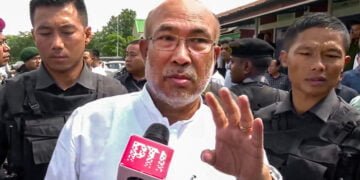Another contentious issue is the proposed amendment to the Khasi Custom of Lineage Act brought by Chief Executive Member Hispreachering Son Shylla of the Khasi Hills Autonomous District Council. The amendment aims to revoke Khasi women’s customary and legal privileges upon marriage to non-Khasi men. While purportedly intended to protect the ethnic community, this interpretation clashes with principles of natural justice and faces opposition from some liberal women leaders advocating for women’s rights.
Ignoring input from credible institutions like village and locality councils, civil society groups, social scientists, kinship organisations, and cultural experts risks distorting the genuine issue into a women’s rights concern by pressure groups like Thma U Rangli and Civil Society Women’s Organisation. A middle ground may involve Shylla engaging in thorough debate with credible institutions and civil society groups, while pressure groups should avoid prejudiced opinions on colonial-influenced customary practices. The bill’s recall by the KHADC suggests a collective desire for sensible decision-making, although the situation remains unsettled.
The Clan Bill has been introduced with provisions aimed at safeguarding the interests of Khasi clans in vulnerable social situations prone to legal misinterpretation by opportunists. Concurrently, the Synjuk Ki Rangbah Kur (SKRK) was established under the leadership of Hisprechering Son Shylla, who subsequently passed the baton to former judicial officer Herman Nongrum upon completion of his tenure in the Khasi Hills District Council.
The SKRK, comprising clan elders from all Khasi clans, collaborates closely with active clan organisations or Seng Kur, encouraging each clan to establish its own organisation and affiliate with the SKRK. Shylla’s decision to step down was aimed to focus on other social reform initiatives. The SKRK is actively promoting the establishment of clan elder units to restore the ancient system and adapt indigenous society to contemporary circumstances.
It is widely recognised in society that a significant number of middle-class Khasi women and those from poorer backgrounds engage in casual marriages with individuals from other communities for personal economic gain and social security. This reality, evident without the need for statistics, often leads to separation, leaving many Khasi women as single parents who may adopt rebellious stances. Weak family structures, where male members lack authority to protect their families, exacerbate the situation. Khasi women typically dominate decision-making processes due to men’s limited authority over their wives and children, as well as diminished respect within their maternal families.
The dual roles of Khasi men as fathers and maternal uncles have been blunted, with many women challenging both their husbands and male relatives on various issues. Women may exploit traditional customs and Christian traditions to serve their interests, resisting interference from husbands, brothers, or maternal uncles. However, some families have maternal uncles who serve as responsible guardians over their nephews and nieces, assuming paternal rights and responsibilities.
Human nature’s inclination toward excess is evident, with some Khasi men selfishly hoarding earnings while blaming expenses on wives’ or maternal families. Similarly, some Khasi women accumulate significant family wealth and seize ancestral properties, overriding parental and sibling rights.
In this manner, extensive valuable resources that have been preserved for generations within the community are being exploited by numerous legitimate youngest daughters of various families, either acting independently or in collusion with their unscrupulous husbands. In certain cases, even in-laws are involved in fraudulent activities.
Moreover, many Khasi wives are vulnerable to deception by husbands from other communities, both in terms of material wealth and personal relationships. Members of other communities, exposed to complex socio-economic situations prevalent in commercially advanced regions, can tactfully manipulate simple Khasi women in various transactions, including marital commitments.
When the family atmosphere is stable and husbands from other communities gain a foothold, they often assert control over domestic affairs. These individuals, hailing from dominant communities, may also attempt to impose their culture on children and occasionally alienate their Khasi wives, who may feel compelled to tolerate their husbands’ desires to remarry within their own communities as dictated by their in-laws. This attitude and hegemony of mainland people toward tribal people reflect a broader pattern where dominant cultures from surrounding mainstream areas tend to overshadow those of neighbouring peripheries.
The crux of the matter lies in the fact that ancient customary practices are already in place to ensure equitable distribution of family properties among maternal offspring. Apart from natural inheritance for any married female member of the maternal family prepared to establish her own family, customary law allows for a portion of family property to be allocated to male members of the maternal family, such as nephews or sons who have contributed to the general welfare of the maternal family. Thus, it is crucial to reinforce existing ancient customs rather than amend flawed laws enacted by the British colonial administration.
THE INFLUENCE OF CHRISTIANITY ON MATRILINEALITY
Initially met with resistance due to its foreign cultural nature, Christianity eventually gained traction among the indigenous Khasi people through the missionary efforts of the Welsh Calvinistic Presbyterian Church. This was facilitated by social welfare initiatives and the profound impact of the life story of Jesus Christ, which resonated with many. Education also played a crucial role in empowering individuals and ensuring social security. However, the overarching goal of Christian missions was to instill and spread Christian values, ultimately converting people to the Christian faith.
Christianity’s roots lie in Israel, with the church originating in places associated with the life, passion, and sacrifice of Jesus Christ, fervently propagated by his disciples. The Middle East and Egypt served as significant regions for the emergence and growth of Christianity and Islam, both tracing their roots to Israel’s cultural legacy.
The Quran and the Bible chronicle the mythology and history of the Israeli people. Christianity flourished in Europe alongside the progress of modern civilisation, with Rome serving as a benchmark for Christian tradition. However, dissent and rebellion led to the fragmentation of various denominations, including Welsh missionaries who branched off from larger denominations.
Despite being subjugated under British imperialism, Welsh missionaries remained larger and more advanced compared to the Khasi community, situated in one of the remotest parts of the world. Over time, Khasi animism and humanism concepts gradually declined as Christianity gained prominence, influenced by social, cultural, political, and economic factors.
The profound impact of Christian evangelism, coupled with the backdrop of modernity, has led to significant progress and prospects for the Christian religion. However, this trend has also contributed to the erosion of Khasi animism and humanism traditions, often viewed with prejudice and contempt. While human endeavors for social harmony and political ambition are natural, they can also be tainted by excessive desires for power, fame, and wealth. This has historically motivated invasion, domination, and the imposition of individual and communal ideas onto subjugated alien communities, often incompatible with their cultures.
Certain secular elements may be adaptable for universal application, but many subjective aspects are forced to be subsumed with mockery. Christianity, perceived as one such tactful imposition, has deeply entrenched itself within the Khasi community, becoming almost synonymous with Khasi ethnic identity. Various denominations have emerged, often reliant on overseas funding for survival. Established churches may prioritise business ventures over religious affairs, leading to the neglect and dismantling of heritage religious structures in favor of commercial complexes.
The Seng Khasi movement, initiated in 1899 to conserve ethnic cultural and religious traditions, has either stagnated or declined in the face of modern trends. During the early period of Christian missionary activities, Khasi cultural and religious traditions were ridiculed and deemed impure or satanic. Local folk festivals, ceremonies, and socio-religious occasions were forbidden, with instances of intimidation by British authorities.
Many who embraced Christianity disposed of intellectual and material properties, manipulated by unscrupulous British colonial officials who coerced them into relinquishing precious gold and silver ornaments under the guise of taboo or Christian sin. Local superstitions, such as the belief that the ‘Thlen’ demon resided in precious articles, were exploited to convince converts to relinquish their belongings.
These covert and immoral schemes perpetuated by British colonial criminals positioned converts as indebted to the officials as saviors from supposed evil forces, despite their role in perpetuating exploitation and accumulating wealth from scams. Thus, conversion tactics ranged from persuasion and compassion by Welsh missionaries to coercion and cruel oppression by British colonial authorities.
Before the invasion of British imperialism and subsequent conquest, the Khasi people lived in clusters of clans with each clan having its own territorial demarcation. Women primarily remained within these territories, while men ventured outside for various occupations and ventures. In the matrilineal system, men would seek out wives from different clusters not affiliated with their own clan and then return to their maternal families.
Men’s role as husbands and fathers was to provide both mental and material support to their wives and children, with the paternal mother often contributing resources out of care and concern for the family bond. The maternal family highly valued provisions from the paternal family as blessings from the paternal mother, acknowledging them with great tribute. Men were expected to remain in the maternal home and take responsibility for the social well-being of their mothers, sisters, brothers, nephews, and nieces.
























